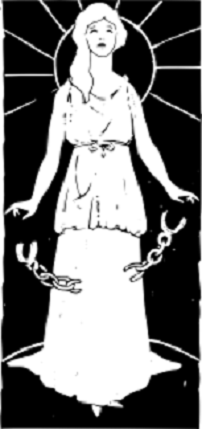
Courtesy of wikipedia.com
An article appeared on Facebook recently that quoted a preacher who in 2019 sermonized that educating women was a sin. His sentiment reflects the values found in the New Testament, but the idea that women should be subservient to men probably goes back to the dawn of human existence.
For a brief time, women may have been treated with reverence. Anthropologists who have studied tribal habits as far back as the stone age believe the concept of fatherhood had yet to form in those early societies. Women gave birth as a result of shedding blood, which led our ancestors to believe children were born of a woman’s blood–a fluid so precious that Gods required it as a sacrifice. (“Man Made God”, by Barbara G. Walker, Stellar House Publishing, 2010, pgs. 76-77.)
When men finally learned they had a role in bringing life into the world, women not only fell from their pedestals but in many cultures reverence for menses blood became taboo. In fact, to this day some societies isolate women from the general population during their periods. Blood is also the reason why the Catholic Church bars women from the priesthood. A sacrament provided by a woman in menses would be tainted. (Ibid pg. 80.)
Once feminine authority came into question, patriarchy took hold and embedded itself throughout society, most notably in religious doctrine. Take Christianity’s Adam and Eve myth, for example. Adam, an innocent, falls prey to the temptress, Eve. Her duplicity brings death into the world, a sin for which not only she must pay but all her descendants. Women were forever branded as devious and as such, they must submit themselves to the rule of men– a power in some religious law which includes decisions about whether they shall live or die. While western culture is less extreme in its attitude toward women, the stain of inferiority persists, as witnessed by the rate of violence women endure. In 2017 global femicides rose to 87000 with victims in the United States accounting for 1087 of the total.
Even in civil law, women have had to wait for equality and justice. While in 1870, the 15th Amendment to the U. S. Constitution granted African American men the vote, women of color weren’t granted the same privilege until the Voting Rights Act of 1965. To underscore that women remain “the least of these,” in the 2009 U. S. Presidential election, a man of color broke the glass ceiling of racial prejudice. A woman has yet to accomplish the same for her sex.
Discrimination against women is long-standing and can be counted in centuries, not years. It has fallen as a yoke upon feminine shoulders for so long, many see it as natural and are willing to rise up against the ambitions of their sisters. I know of no other state of inferiority that has been tolerated for so long by so many. Though women are not a minority, they remain oppressed, unable to raise a sustained cry of protest to obliterate their history as chattel.
